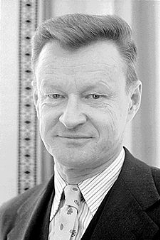
political scientist, geostrategist
, and statesman
who served as United States National Security Advisor to President
Jimmy Carter
from 1977 to 1981.
Major foreign policy events during his term of office included the normalization of relations
with the People's Republic of China (and the severing of ties with the Republic of China
); the signing of the second Strategic Arms Limitation Treaty
(SALT II); the brokering of the Camp David Accords
; the transition of Iran
from an important U.S.
"This will require a review of our policy toward Pakistan, more guarantees to it, more arms aid, and, alas, a decision that our security policy toward Pakistan cannot be dictated by our non-proliferation policy." ![]()
"What is most important to the history of the world? The Taliban or the collapse of the Soviet empire? Some stirred-up Moslems or the liberation of Central Europe and the end of the cold war?" ![]()
"...foreign policy of a pluralistic democracy like the United States should be based on bipartisanship because bipartisanship is the means and the framework for formulating policies based on moderation and on the recognition of the complexity of the human condition. That has been the tradition since the days of Truman and Vandenberg all the way until recent times."![]()
"It was July 3, 1979, that President Carter signed the first directive for secret aid to the opponents of the pro-Soviet regime in Kabul. And that very day, I wrote a note to the president in which I explained to him that in my opinion this aid was going to induce a Soviet military intervention."![]()
"nation state as a fundamental unit of man's organized life has ceased to be the principal creative force: International banks and multinational corporations are acting and planning in terms that are far in advance of the political concepts of the nation-state."![]()
"...foreign policy of a pluralistic democracy like the United States should be based on bipartisanship because bipartisanship is the means and the framework for formulating policies based on moderation and on the recognition of the complexity of the human condition. That has been the tradition since the days of Truman and Vandenberg all the way until recent times."![]()
"In the technotronic society the trend would seem to be towards the aggregation of the individual support of millions of uncoordinated citizens, easily within the reach of magnetic and attractive personalities effectively exploiting the latest communications techniques to manipulate emotions and control reason."![]()

